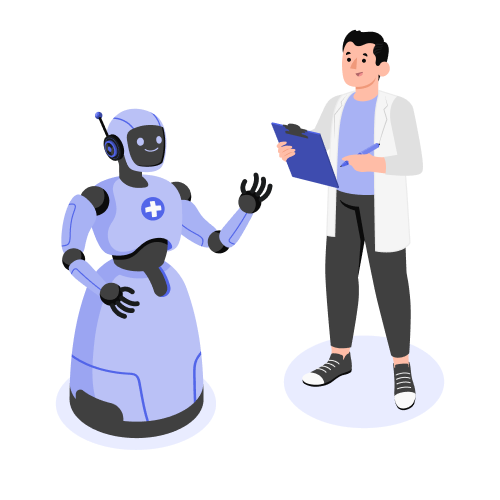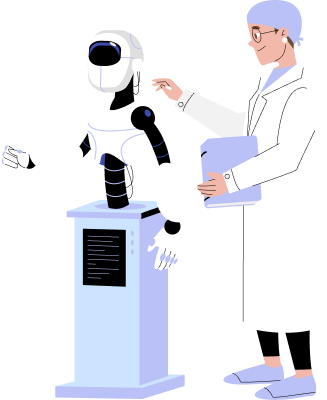- Advantages of AI in Medical Diagnosis
- Personalized Treatment
- Speeds Up the Healthcare Practices
- Reduced Diagnostic Errors
- Scalability and Accessibility
- Enhanced Data Integration and Analysis
- Real-Time Monitoring and Proactive Alerts
- Cost Efficiency and Resource Optimization
- Continuous Learning and Improvement
- Key Applications of AI in Medical Diagnosis
- Symptom Analysis & Personalized Treatment
- Risk Prediction
- Clinical Trials
- Virtual Biopsies
- Oncology
- Pathology
- Contributions to Ophthalmology
- Infectious Outbreaks Prediction
- Improving Access to Dermatology
- Delicate and Minute Details
- Disease Classification
- Real-Time Data Analytics
- Male Infertility Diagnosis
- Assessing Cardiovascular Risk
- Adding in the Longer Lifespan
- Fine-Tuning Treatment
- The Challenges of AI in Medical Diagnosis
- Data Privacy
- Data Quality and Availability
- Interoperability Issues
- Regulatory Compliance
- Ethical Considerations
- Implementation Cost
- Workflow Integration
- How Should an AI-Powered Diagnostic Software Look?
- Businesses Leveraging AI in Medical Diagnosis
- Cleveland Clinic
- Mayo Clinic
- Massachusetts General Hospital
- Mount Sinai Health System
- Johns Hopkins Medicine
- Future of AI in Healthcare
- Enhanced Diagnostic Accuracy
- Expanded Accessibility
- Integration with Genomic Data
- Automation of Routine Tasks
- Real-Time Health Monitoring
- Collaborative AI
- Ethical AI Use
- Proactive Healthcare Management
- Leverage AI in Medical Diagnosis with Appinventiv’s Expertise
- FAQs
Artificial intelligence (AI) is increasingly transforming healthcare, especially in disease diagnostics and therapeutic management. From automating administrative tasks to optimizing workflow in medical diagnostics, AI has shown remarkable potential to reduce the burden on healthcare systems by offering more accurate and timely diagnoses.
Accurate diagnosis is paramount for global healthcare. In the United States, around 5% of patients receive incorrect diagnoses, and these errors are particularly common in serious medical conditions, posing significant risks to patients.
AI and machine learning offer powerful tools to address these challenges by improving diagnostic precision. Recent advances also include using causal reasoning in machine learning, paving the way for more reliable diagnoses even in regions with limited access to healthcare providers.
Major studies consistently highlight the growing impact of AI in medical diagnosis:
According to a Statista survey, about 11% of healthcare providers in the US are in the mid-stage of AI-adoption, while more than 21% use LLMs to answer patient queries. These statistics underscore the healthcare industry’s commitment to adopting AI solutions that enhance clinical outcomes and improve patient safety.
Given this momentum, it is clear that AI is set to revolutionize medical diagnostics. Suppose you, too, are ready to embrace the transformative power of AI in your healthcare practice. In that case, this blog will help you understand how to effectively implement AI technologies to enhance diagnostic accuracy, streamline operations, and ultimately improve patient outcomes. Let’s delve deeper into the benefits and applications of AI in medical diagnosis.
Advantages of AI in Medical Diagnosis
The benefits of AI for medical diagnosis are innumerable and undeniable, significantly enhancing the quality and efficiency of healthcare. Here are some of the most remarkable benefits of AI in medical diagnosis.
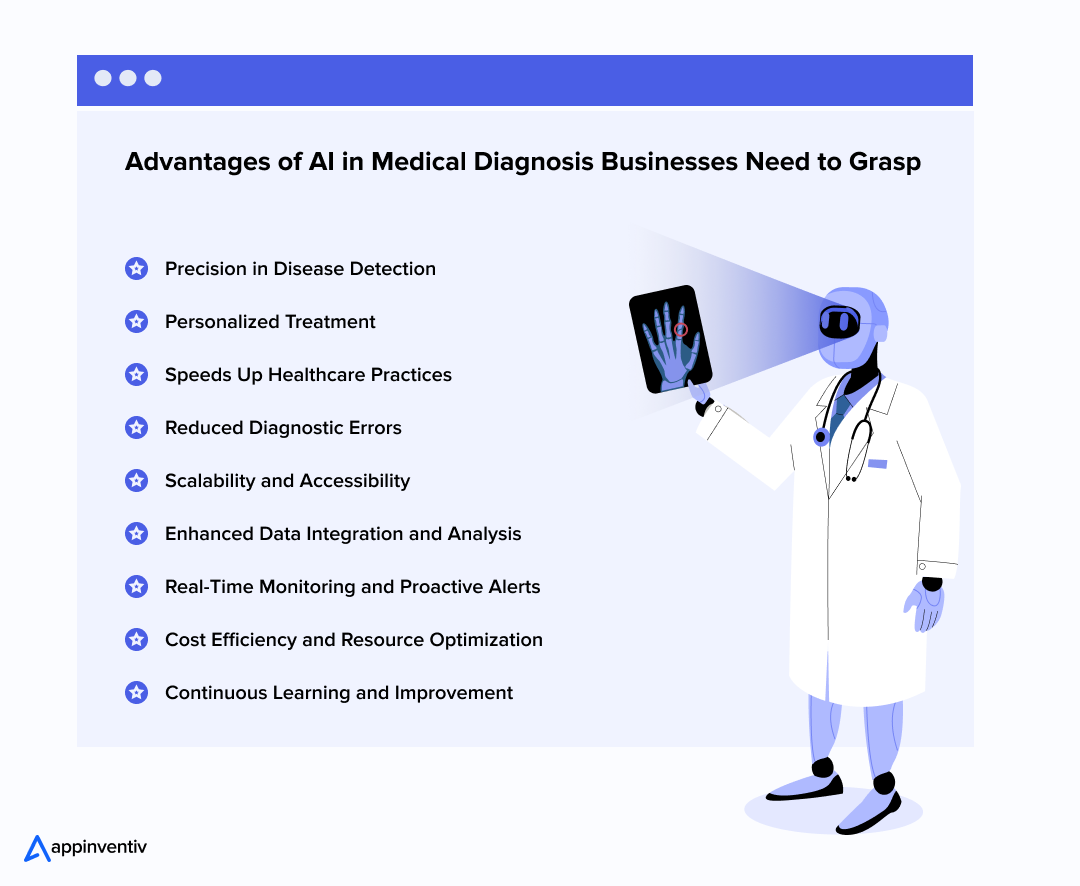
Precision in Disease Detection
AI in medical diagnosis excels at detecting chronic ailments like cancer, heart disease, and neurological disorders. This leads to timely interventions and better patient care.
Personalized Treatment
AI can recommend personalized treatment plans by analyzing vast volumes of patient-specific data, including genetic information and lifestyle factors.
Speeds Up the Healthcare Practices
AI-driven tools can process and interpret medical images, lab results, and clinical notes much faster than human professionals. This reduces the time required for diagnosis and delivering effective care.
Reduced Diagnostic Errors
Diagnostic errors, which can have severe consequences on human health, can be significantly minimized with AI. AI recognizes patterns and anomalies that humans may overlook, thereby minimizing misdiagnosis and enhancing patient safety.
Scalability and Accessibility
AI diagnosis in healthcare app development and wearable devices can extend diagnostic capabilities to underserved areas, helping deliver effective care in regions with limited access to healthcare professionals.
Enhanced Data Integration and Analysis
AI aggregates and analyzes data from multiple sources like electronic health records, imaging, and genetic profiles, creating a comprehensive view that supports more informed decisions.
Real-Time Monitoring and Proactive Alerts
With continuous monitoring through wearables and sensors, AI can detect early warning signs and alert healthcare providers in real time, enabling timely intervention before conditions worsen.
Cost Efficiency and Resource Optimization
By automating routine diagnostic tasks and streamlining workflows, AI reduces operational costs and allows medical staff to focus on critical patient care, maximizing overall efficiency.
Continuous Learning and Improvement
AI systems evolve by learning from new data, steadily improving diagnostic accuracy. This ongoing refinement adapts to emerging trends and health conditions, ensuring sustained reliability in diagnosis.
Key Applications of AI in Medical Diagnosis
Artificial intelligence in medical diagnosis assists healthcare practitioners across various departments by analyzing symptoms, detecting lethal ailments early, suggesting targeted therapies, and predicting potential risks. Whether in surgery, pathology, infertility, pandemic, or patient management, AI is becoming an integral tool in every medical care department, revolutionizing how critical conditions are diagnosed and care is delivered.
Here are several cases of AI used in medical diagnosis that can benefit the industry and patients alike.
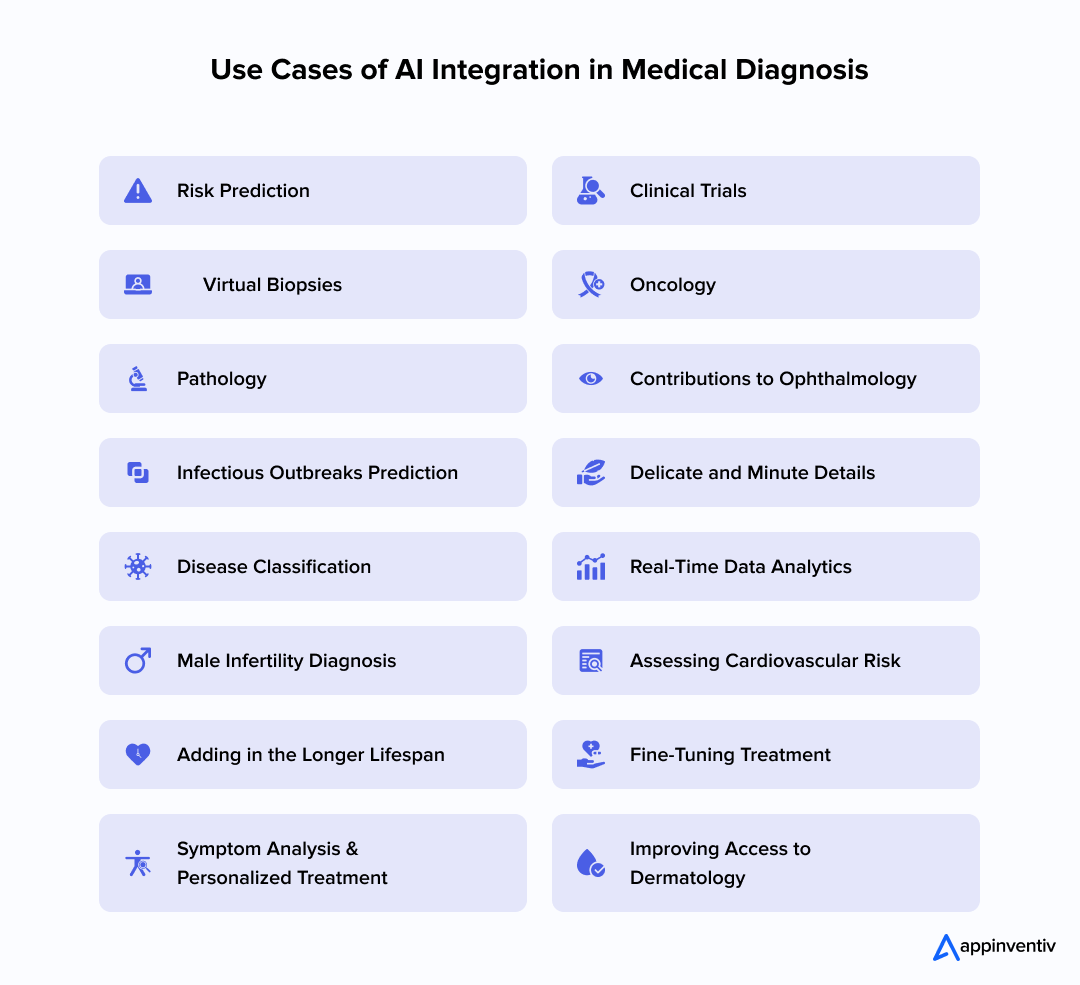
Symptom Analysis & Personalized Treatment
Many healthcare practitioners and organizations are already using intelligent symptom checkers. This machine learning system asks patients several questions regarding their symptoms and then recommends appropriate next actions for seeking therapy based on their responses.
Healthcare companies are increasingly adopting web-based, AI diagnostic tools to deliver personalized advice and information to patients, aligned with the latest guidelines from the Centers for Disease Control and Prevention (CDC).
Furthermore, AI medical diagnosis technology can advance precision medicine (healthcare tailored to the individual) by synthesizing data and forming conclusions, allowing for better-educated and personalized therapy. Deep learning algorithms can examine huge volumes of data, including a patient’s other molecular/cellular analysis, genetic content, and lifestyle factors, and uncover relevant research that can help doctors choose therapies.
Risk Prediction
Medical diagnosis AI can also be used to create algorithms that forecast individual and community health risks to improve patient experiences. Doctors at the University of Pennsylvania developed an algorithm in machine learning in the medical field that can track hundreds of important characteristics in real-time to predict sepsis or septic shock in patients 12 hours before symptoms appear. This is one of the most remarkable ways AI is used in medical diagnosis and can be exploited to its fullest potential.
Clinical Trials
AI is revolutionizing clinical trials by enhancing diagnostic accuracy and reducing the frequency of errors. By leveraging deep learning, AI can analyze complex datasets to identify patterns and anomalies that traditional methods might miss. This improves disease detection efficiency and ensures more reliable and precise diagnoses. The integration of AI in clinical trials underscores its critical role in advancing medical diagnostics, eventually leading to better patient outcomes.
Virtual Biopsies
AI is transforming diagnostics by replacing traditional tissue samples with “virtual biopsies,” allowing clinicians to detect tumor characteristics and genetic traits without invasive procedures. By utilizing sophisticated algorithms and imaging techniques, AI in healthcare diagnostics can provide detailed insights into the nature of a tumor, offering a non-invasive alternative that reduces patient discomfort and the risks associated with surgical biopsies.
Virtual biopsies not only streamline the diagnostic process but also allow for more frequent monitoring of tumor progression, which is critical in tailoring personalized treatment plans. This approach can lead to earlier detection of changes in tumor behavior, significantly improving patient outcomes and making treatment more effective.
Oncology
Oncology, a branch of medicine that focuses on the study, diagnosis, treatment, and management of cancer, is significantly enhanced by AI medical diagnosis. According to Grand View Research, the global market size of AI in oncology is expected to reach a valuation of $19.17 billion in 2030, witnessing a CAGR of 28.92% from 2024 to 2030.
AI in healthcare diagnostics helps understand the biological and genetic basis of cancer and develop targeted treatment strategies. By analyzing vast amounts of patient data and imaging, AI aids in early detection and precise diagnosis of fatal cancers, such as lung and breast cancer. This technology supports personalized treatment plans, optimizes therapy, and improves patient outcomes, driving cancer care and management advances.
Here is a deeper insight into how AI in Oncology can fight against deadly cancers.
1. Breast Cancer Detection and Monitoring
Breast cancer screening is crucial for early detection, but accurate and consistent diagnosis remains challenging, with nearly half of all women experiencing a false-positive result over 10 years. It is where AI comes into the frame in diagnosing and monitoring breast cancer.
A study published in a Journal shows that an AI system can monitor breast cancer with 95% accuracy, matching the performance of an average breast radiologist.
A prominent example of AI in medical diagnosis for breast cancer detection is Google Health. This global tech giant demonstrated the potential of its AI model to analyze de-identified, retrospectively collected screening mammograms with accuracy comparable to, or even better than, that of clinicians. These advancements highlight the growing role of medical diagnosis AI in enhancing breast cancer diagnosis and reducing the incidence of false positives.
Also Read: AI in Radiology Reimagined: Unveiling the Future
2. Predicting Lung Cancer
Lung cancer is the leading cause of cancer-related deaths globally, with the highest mortality rates among both men and women, making early detection a critical challenge.
According to a report, AI-driven lung cancer screening is more effective than traditional methods. It can detect lung cancer correctly more than 90% of the time, compared to 70–80% with older techniques, and it reduces false alarms by up to 30%.
It also improves accuracy in identifying healthy lungs to 85–90% and works much faster. By integrating AI in diagnostics workflows, physicians can more reliably identify lung cancer at earlier stages, potentially improving patient outcomes and reducing mortality.
Pathology
AI is significantly transforming the field of pathology by leveraging facial recognition to identify phenotypes associated with rare diseases. Machine learning technologies enable pathologists to detect diseases in tissues and fluids more precisely and quickly. This improves diagnostic accuracy and accelerates the process, allowing for quicker treatment decisions. It also supports personalized medicine by detecting genetic markers and streamlining workflows.
Contributions to Ophthalmology
AI has also made strides in ophthalmology, with smartphone-based fundus cameras and low-power microscopes equipped with cameras being used to diagnose diabetic retinopathy. This technology enhances the potential of telehealth by enabling remote diagnosis and treatment.
Infectious Outbreaks Prediction
AI in medical diagnosis can effectively predict infectious outbreaks. Advanced AI algorithms can efficiently analyze vast volumes of publicly available data, enabling epidemiologists to track the spread and progression of contagious diseases more accurately.
Improving Access to Dermatology
With the help of smartphones and other portable gadgets, artificial intelligence in medical diagnosis has extended to dermatology. The applications of ML, computer vision, and AI for medical diagnosis in dermatology focus on picture analysis and classification, and the capacity to distinguish between malignant and benign skin conditions.
These technologies assist individuals in researching and identifying their skin, hair, and nail conditions and taking proactive actions.
Delicate and Minute Details
AI in medical diagnosis surpasses the capabilities of the human eye by analyzing and interpreting thousands of images in seconds, identifying patterns that may go unnoticed by humans. This makes AI in medical imaging highly valuable, where overworked radiologists may miss subtle details after reviewing hundreds of other images. AI medical image analysis supports professionals in applications like these by prioritizing photos most likely to reveal a problem.
For example, AI in dentistry can be employed to meticulously analyze dental X-rays and intraoral images, detecting early-stage issues such as enamel erosion, micro-fractures, and subtle signs of decay that might otherwise go unnoticed.
Disease Classification
AI plays a crucial role in image-based disease classifications, computer-aided diagnosis (CAD), and image disease segmentation. How? The ability of deep learning technologies or artificial intelligence in medical diagnosis to examine photos and find patterns brings up the possibility of developing algorithms to assist doctors in diagnosing specific diseases more quickly and precisely. AI disease detection systems speed up the diagnostic process and improve accuracy by learning from a vast array of cases, continually refining their ability to identify subtle variations in diseases and enhancing patient outcomes over time.
Real-Time Data Analytics
Acquiring reliable information in real time is a vital component in diagnosing, preventing and treating medical disorders, and this can be achieved by using AI to diagnose diseases. Doctors, along with other medical professionals, can use AI in medical diagnostics to accelerate and optimize important clinical decision-making with real-time and precise data. This leads to instant and accurate results, enabling better preventative measures, cost savings, and reduced patient waiting times.
Real-time analytics can also improve physician-patient interactions. Making crucial patient data available via mobile applications allows patients to participate more actively in their treatments. Additionally, doctors and nurses can receive mobile alerts about critical changes in patient status, ensuring timely responses during emergencies.
You may like reading: Use Cases and Benefits of AI Analytics for Businesses
Male Infertility Diagnosis
Male infertility, impacting millions of men worldwide, has seen significant advancements due to AI and assisted reproductive technologies (ARTs). AI techniques—such as machine learning, neural networks, deep learning, and natural language processing (NLP), play a vital role in evaluating seminal quality, predicting fertility, diagnosing sperm issues, and guiding reproductive decisions.
Future applications may include AI in ultrasonography, microsurgical sperm extraction, and home-based analysis, positioning AI as a transformative force in male infertility diagnosis and treatment.
Assessing Cardiovascular Risk
AI enhances cardiovascular risk assessment by analyzing medical images such as echocardiograms and CT scans. These technologies detect early signs of cardiovascular disease, such as arterial plaque and abnormal blood flow, with high accuracy. AI integrates imaging data with patient health records to provide comprehensive risk predictions and personalized treatment plans. By automating image analysis, AI improves diagnostic precision and speeds up decision-making, ultimately supporting better prevention and management of cardiovascular conditions.
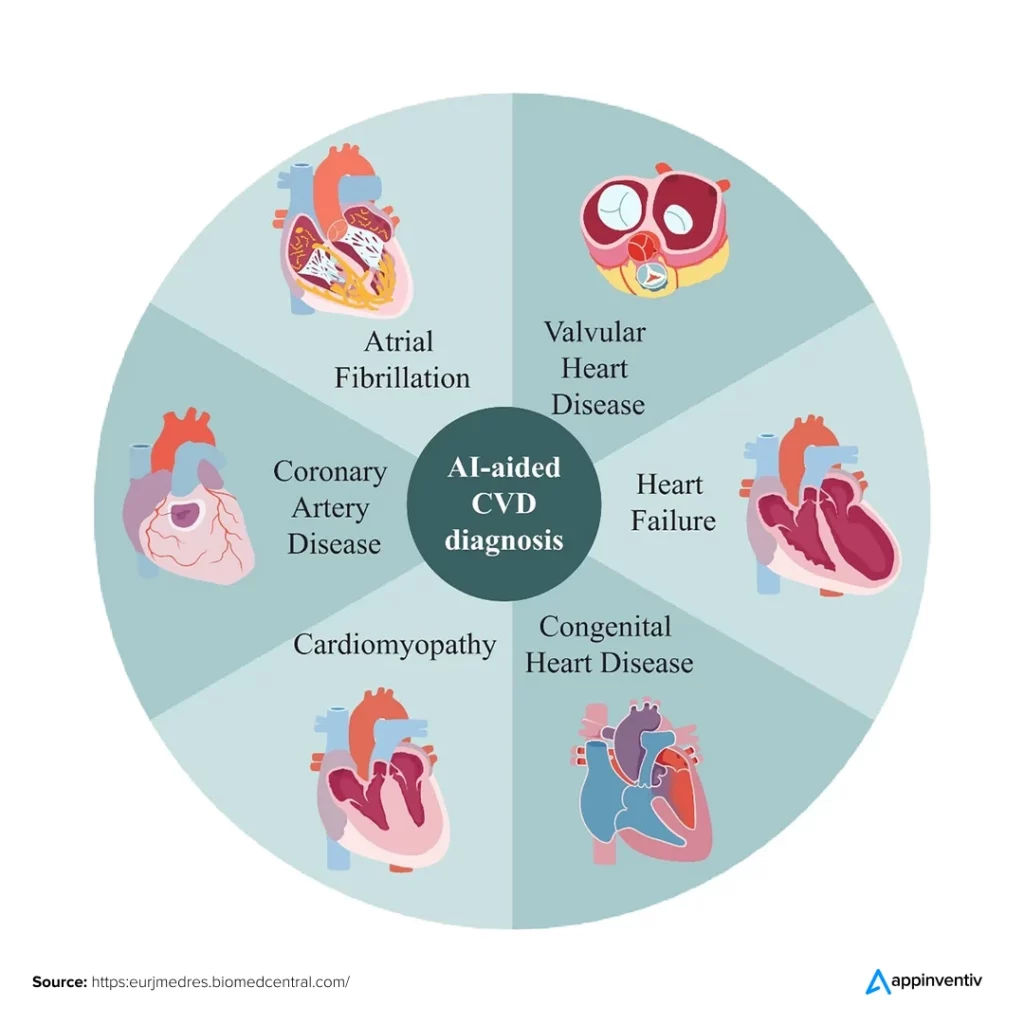
Adding in the Longer Lifespan
You might wonder how artificial intelligence in medical diagnosis can help people live longer. Well, it is no surprise that AI algorithms can analyze our medical, behavioral, and environmental data. As a result, they can anticipate our biological age and advise us on how to stay fit and fine.
AI is already being integrated with aging research to develop an aging clock that will aid in tracking immunosenescence levels and identifying new therapies to strengthen the immune response in the elderly. This will also help diagnose medical issues early and predict risks based on an individual’s lifestyle and other factors.
Fine-Tuning Treatment
AI medical diagnosis can also help those with chronic or lifelong illnesses. For instance, machine learning algorithms can analyze data from cochlear implant sensors, giving users feedback to improve their communication with the hearing world. Additionally, AI technology can assist doctors in tailoring therapies to meet each patient’s specific needs.
We can help you craft custom, AI-driven diagnostic softwares that elevates patient care and redefines the future of medicine!
The Challenges of AI in Medical Diagnosis
Despite the promising potential of AI for medical diagnosis, the technology also poses several challenges that need to be addressed to realize its maximum capabilities in healthcare. Here are some common challenges in AI for medical diagnosis with their potential solutions:
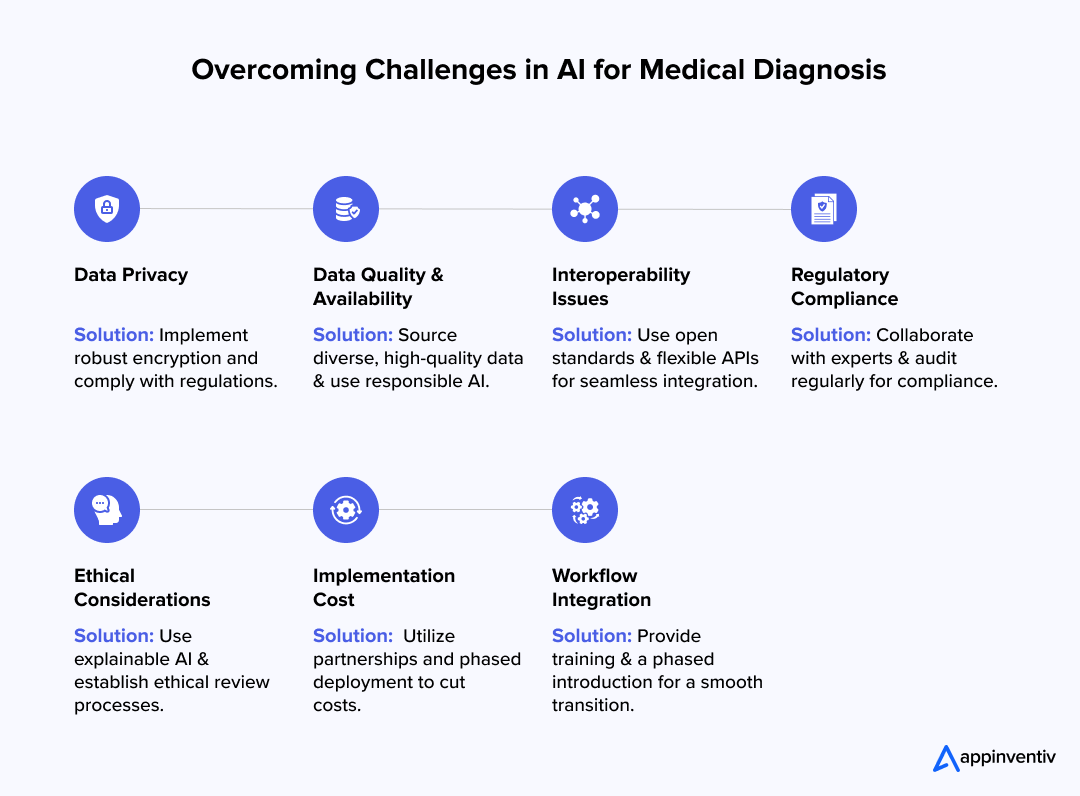
Data Privacy
Challenge: The use of AI in medical diagnosis involves handling sensitive patient information. Though data analysis is essential to leverage AI’s diagnostic capabilities, it also raises concerns about data security and privacy breaches.
Solution: To address this concern associated with AI doctor diagnosis tools and more, you should implement robust data encryption protocols in AI models, ensuring compliance with healthcare regulations like HIPAA.
Data Quality and Availability
Challenge: AI systems rely on large datasets for training and accuracy. However, data inconsistencies and biases can result in discrepancies in diagnoses among marginalized groups.
Solution: To address this challenge, collect high-quality data from diverse data sources. Also, employ explainable AI and responsible AI practices to detect and correct data biases.
Interoperability Issues
Challenge: Integrating AI disease diagnosis tools with existing healthcare technologies can be challenging due to interoperability issues, diverse data formats, and differences in software platforms.
Solution: Develop AI solutions with open standards and flexible APIs that enable seamless integration with various healthcare systems, ensuring compatibility and smooth data exchange across platforms.
Regulatory Compliance
Challenge: AI systems must adhere to strict healthcare regulations, which can slow down development and implementation.
Solution: Work closely with regulatory experts and conduct regular compliance audits to ensure AI models meet all necessary standards.
Ethical Considerations
Challenge: Ensuring that AI decisions are fair and transparent is crucial, especially when they impact patient care.
Solution: Develop explainable AI models and establish ethical review processes to monitor and adjust AI decision-making practices.
Implementation Cost
Challenge: The development and maintenance of AI systems can be expensive, creating a barrier for many healthcare providers.
Solution: Consider strategic partnerships, phased deployment plans, and the use of open-source tools to manage and reduce costs.
Workflow Integration
Challenge: Integrating AI tools into clinical workflows can disrupt established practices and add complexity.
Solution: Provide comprehensive training for healthcare staff and gradually introduce AI solutions to ensure smooth adoption and minimal disruption.
How Should an AI-Powered Diagnostic Software Look?
Every custom software solution is designed to meet unique business needs, but an AI-powered diagnostic tool requires a special mix of features to stand out. Let’s look at some basic and advanced features that can make your diagnostic software the ultimate solution in healthcare.
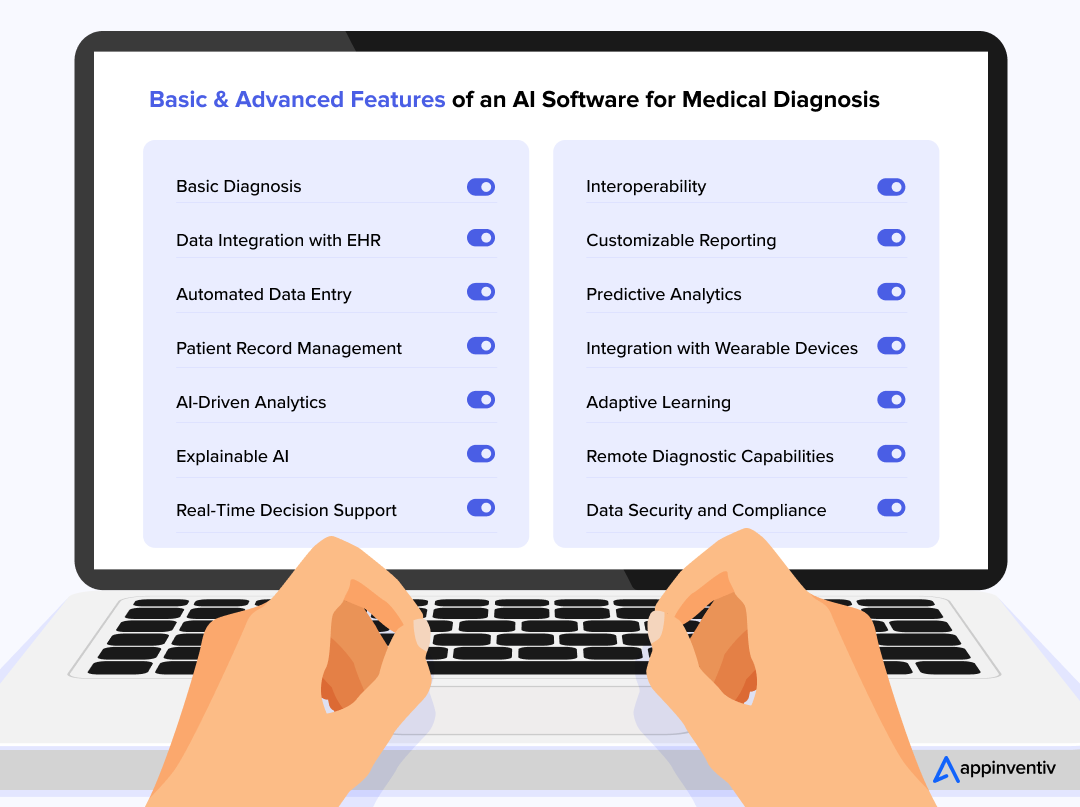
Basic Diagnosis
- Processes common diseases using pre-trained models to deliver quick and reliable diagnostic outputs.
- Provides initial insights with minimal input.
Data Integration with EHR
- Connects seamlessly with electronic health records and lab systems to aggregate patient data.
- Creates a comprehensive view for improved diagnostics.
Automated Data Entry
- Captures data automatically from scans and tests, reducing manual entry errors.
- Ensures consistent and accurate information for diagnostic purposes.
Patient Record Management
- Organizes patient data effectively, ensuring easy access to historical records.
- Enhances continuity of care by keeping all relevant information in one place.
AI-Driven Analytics
- Continuously improves diagnostic accuracy by learning from large datasets over time.
- Delivers detailed insights that evolve with emerging patterns and trends.
Explainable AI
- Offers clear, understandable reasoning behind diagnostic decisions.
- Increases clinician trust by making the decision-making process transparent.
Real-Time Decision Support
- Provides instant feedback and alerts based on current patient data.
- Supports timely clinical interventions to improve patient outcomes and care quality.
Interoperability
- Enables smooth integration with various healthcare systems and devices for efficient data exchange.
- Facilitates coordinated care across multiple platforms.
Customizable Reporting
- Generates tailored diagnostic reports that meet specific clinical needs.
- Offers detailed, relevant information to support informed decision-making.
- Uses historical data to forecast potential health issues before they become critical.
- Enables proactive care and resource planning for better patient management.
Integration with Wearable Devices
- Aggregates real-time health data from wearable devices to offer a complete picture of patient wellness.
- Supports continuous monitoring and early anomaly detection.
Adaptive Learning
- Continuously refines its diagnostic models by learning from new data and outcomes.
- Keeps pace with changes in patient populations and emerging medical trends.
Remote Diagnostic Capabilities
- Enables diagnostics in remote settings via cloud-based analysis.
- Supports telemedicine and extends quality care to underserved and remote areas.
Data Security and Compliance
- Ensures robust protection of patient data with advanced encryption and security protocols.
- Complies with healthcare regulations like HIPAA to build trust.
Businesses Leveraging AI in Medical Diagnosis
Businesses across the healthcare sector increasingly leverage AI to enhance medical diagnosis, bringing about faster, more accurate, and efficient patient care. Here are some examples of major AI in medical diagnosis:.
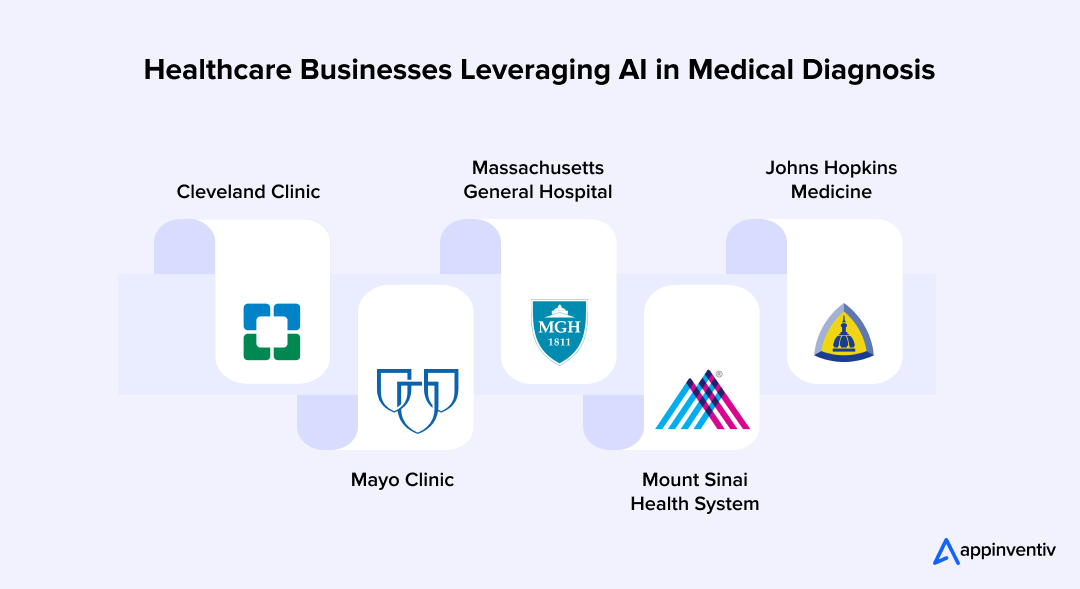
Cleveland Clinic
Uses AI to enhance disease detection and patient management across multiple departments, including imaging diagnostics and treatment outcome predictions.
Mayo Clinic
Employs AI to assist in diagnosing complex diseases like cardiovascular disorders and cancer, utilizing algorithms to analyze medical images and patient data.
Massachusetts General Hospital
Integrates AI in radiology and pathology to help detect subtle patterns in images and slides that human eyes might overlook.
Mount Sinai Health System
Implements AI in clinical laboratories to assist pathologists in identifying test result patterns, aiding in the early detection of diseases such as cancer.
Johns Hopkins Medicine
Incorporates AI to enhance diagnostic procedures and optimize patient monitoring systems, focusing on chronic condition management and treatment efficacy.
Future of AI in Healthcare
The future of AI in medical diagnosis looks promising and transformative, as rapid advancements in technology continue to unlock new potential in healthcare. With AI integration, medical diagnosis is becoming faster and more accurate, and evolving to be more personalized and predictive. Here’s what we can expect in the future of AI for medical diagnosis.
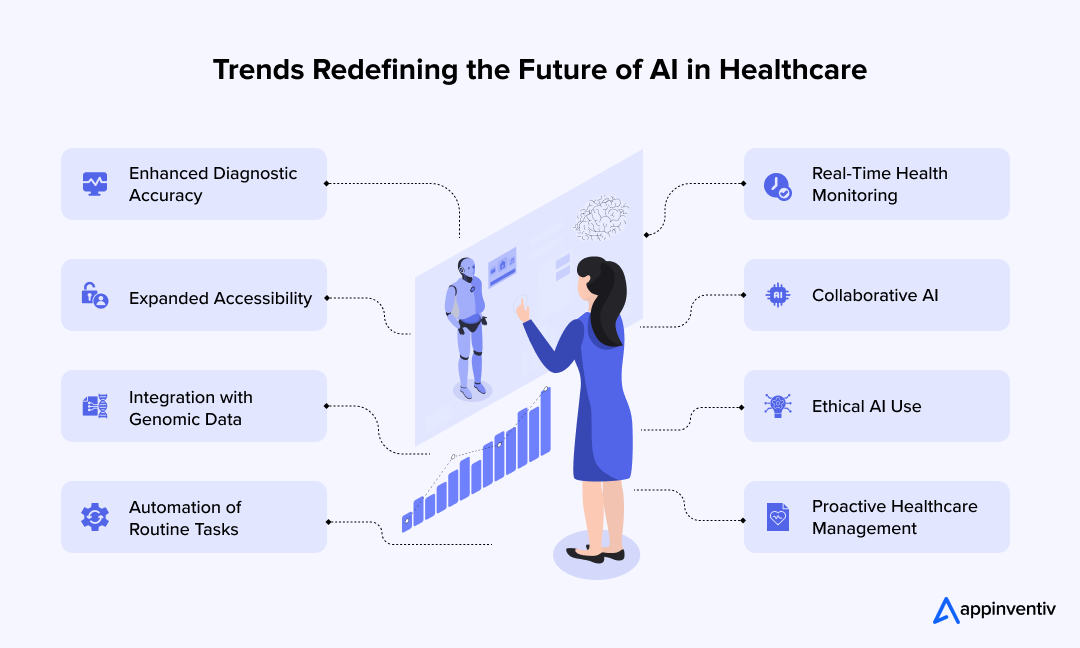
Enhanced Diagnostic Accuracy
AI will continue to refine its ability to analyze complex medical data, leading to higher accuracy in diagnosis, particularly in detecting early stages of diseases such as cancer and neurological disorders.
Expanded Accessibility
AI-powered diagnostic tools will become more accessible to remote and underserved areas, breaking geographical barriers to healthcare and enabling better disease management worldwide.
Integration with Genomic Data
Future AI systems will increasingly integrate genetic information into the diagnostic process, offering a deeper understanding of individual patient risks and conditions, which can lead to tailored treatment plans.
Automation of Routine Tasks
AI will take over more administrative and routine diagnostic tasks, freeing up healthcare professionals to focus on more critical aspects of patient care, improving efficiency and reducing burnout.
Real-Time Health Monitoring
The use of AI with wearable technologies will enhance real-time monitoring of patients, providing immediate insights into patient health and rapid response capabilities.
[Also Read: How Much Does it Cost to Develop a Remote Patient Monitoring Software?]
Collaborative AI
We will see a rise in collaborative AI where systems from different healthcare facilities can share learnings and insights, drastically improving diagnosis techniques and standardizing care.
Ethical AI Use
As the use of AI in healthcare grows, so will the focus on developing ethical guidelines to ensure patient data privacy and unbiased algorithmic decisions in treatment and diagnosis.
Proactive Healthcare Management
AI will shift healthcare from a reactive to a proactive discipline, predicting potential health issues before they become severe and advising on preventative measures.
Leverage AI in Medical Diagnosis with Appinventiv’s Expertise
AI in disease diagnosis is transforming the healthcare industry with advanced diagnostic tools and personalized treatment options, paving the way for more accurate and efficient patient care. As AI medical diagnosis continues to innovate, the future of it promises even more advanced techniques and therapies, making it mandatory for medical professionals to explore the potential of AI in diagnostics, prevention, and treatment.
Appinventiv, a leading medical app development company, is at the forefront of this artificial intelligence revolution, offering cutting-edge custom AI development services in the medical sector. Here’s why we are the right partner for developing AI-powered diagnostic software:
- Pioneers in Precision: We don’t just develop software, but can also engineer precision. We can develop AI software that meticulously meets the specific needs of your medical practice, ensuring that you receive a product that integrates seamlessly with your existing systems and enhances your diagnostic capabilities.
- Ahead of the Curve in AI Innovation: With Appinventiv, you are not just keeping pace with technology, but you are setting it. Our commitment to research and development in AI puts you at the cutting edge of healthcare innovations, giving you a competitive advantage in a rapidly evolving industry.
- Ethical AI Implementation: We understand the sensitivity in handling patient data and the critical nature of medical diagnostics. Appinventiv is dedicated to ethical AI practices, ensuring that every tool we develop upholds the highest data security and patient privacy standards, building trust and reliability.
- Scalable Solutions for Dynamic Needs: The healthcare sector has continually changing needs and challenges. We can help you develop AI software by keeping in mind the overall scalability, allowing you to expand your capabilities as your practice grows and as technology advances, ensuring a long-term partnership that adapts to the future.
- Collaborative Approach to Innovation: When you choose Appinventiv, you select a partner, not just a provider. We believe in a collaborative approach, working closely with your medical experts to ensure that the solutions we develop are technologically advanced, clinically relevant, and user-friendly.
- Real-World Impact: Our focus is on technological innovation and real-world applications that improve patient outcomes. We can turn theoretical possibilities into practical tools that enhance diagnosis, treatment, and prevention, delivering tangible benefits to providers and patients.
For instance, we created YouCOMM, an AI-powered healthcare app that connects in-hospital patients with nurses to obtain aid with their fundamental requirements. This custom patient messaging system allows patients to tell the staff their needs by manually selecting options, such as voice commands and head motions. The astounding results show a 60% growth in nurses’ real-time response time.
For those looking to leverage AI’s impact on medical diagnosis, we can be your ideal tech partner to bring innovative ideas to life. Speak to our experts to explore how we can support your AI-driven medical projects and elevate your healthcare offerings.
FAQs
Q. How AI works in medical diagnosis?
A. AI in medical diagnosis is used to analyze medical data, such as imaging, lab results, and patient records, to detect diseases, predict health risks, and suggest personalized treatment plans.
Also, artificial intelligence in medical diagnosis helps enhance accuracy, speeds up diagnosis, and aids in the early detection of conditions like cancer, infertility, anemia, and cardiovascular diseases, improving overall patient care and outcomes.
To gain an in-depth understanding of AI’s applications in medical diagnosis, please refer to the above blog. Additionally, partnering with a firm like Appinventiv can help you understand the role of AI in Diagnosis.
Q. Which type of information system (is) is used to help doctors diagnose diseases?
A. Clinical decision support systems (CDSS) are the type of information systems primarily used to assist doctors in diagnosing diseases. These systems leverage data from a variety of sources, including patient health records, clinical databases, and research studies, to provide healthcare professionals with recommendations and insights that aid in decision-making. Additionally, advancements in artificial intelligence (AI) have greatly enhanced the capabilities of CDSS.
AI health diagnosis can analyze complex medical data quickly and with a high degree of accuracy, identifying patterns and anomalies that may not be evident to human observers. This can lead to earlier and more accurate diagnoses, particularly in the fields of oncology, neurology, and cardiology, where AI-powered tools are increasingly used to interpret imaging data and genetic information, making the diagnostic process more efficient and effective.
Q. What are the other use cases of artificial intelligence in the medical field?
A. The healthcare business is going through a major transformation driven by advancements in AI. Some of the other use cases of AI and medical diagnosis include:
- Enhanced Treatments: AI provides more accurate, cost-effective, and personalized treatments in real time.
- Disease Detection: AI health diagnosis tools aids in identifying chronic diseases through advanced imaging and risk assessment techniques.
- Efficiency Improvement: AI handles a wide array of tasks more quickly and efficiently than traditionally performed by humans.
- Data Management: As payment models evolve and data volume increases, AI accelerates innovations and helps healthcare providers meet rising patient expectations with greater efficiency and precision.
- Predictive and Adaptive Technologies: AI diagnostic tools can predict, analyze, adapt, and operate, making healthcare processes more streamlined and responsive.
Q. What are the pros and cons of AI for medical diagnosis?
A. The healthcare industry today has widely adopted AI in its day-to-day operations, enhancing medical diagnosis and detection with its advanced capabilities. However, before you embrace AI in medical diagnosis, it is important to consider both the advantages and potential drawbacks:
Pros:
- AI enhances diagnostic accuracy by analyzing vast amounts of data.
- Gives real-time insights that can speed up the diagnostic process.
- Helps in the early detection of diseases and clinical concerns.
Cons
- The potential for an erroneous diagnosis
- Human oversight is essential to ensure AI’s diagnostic accuracy.
- Risks to bias and unethical practices


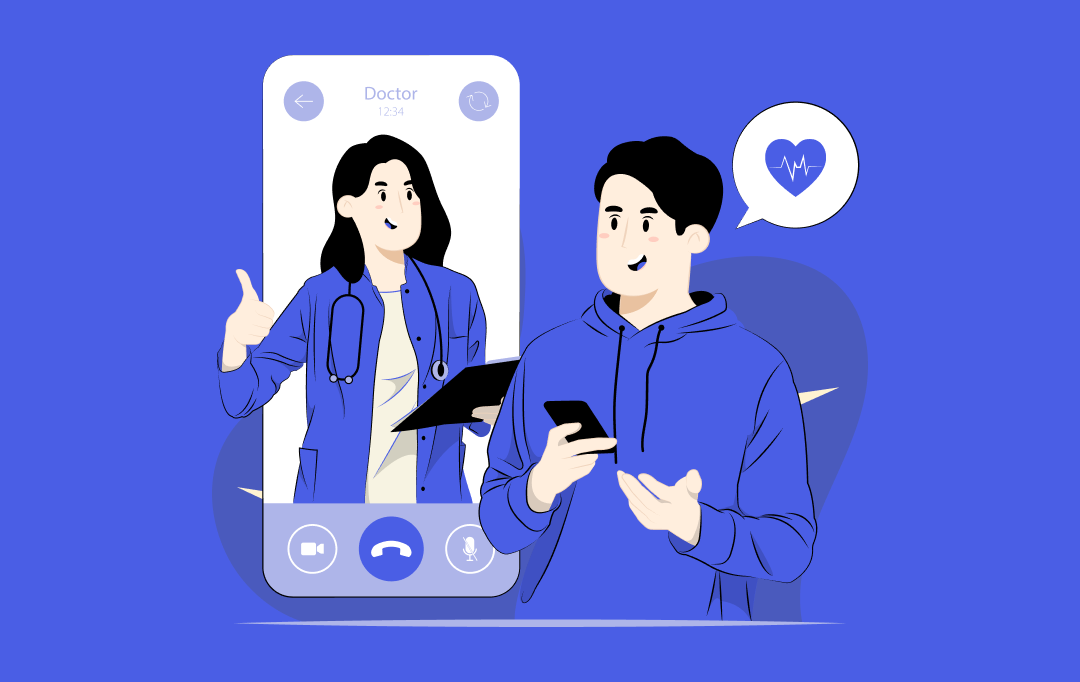
Why Telehealth Security is Non-Negotiable for Patient Trust and How to Achieve It
Key takeaways: Telehealth security is crucial for patient trust and the continued adoption of digital healthcare services. The rising tide of cyber threats, from ransomware to inadequate authentication, poses significant risks to patient data and provider reputation. Implementing robust security measures like end-to-end encryption, multi-factor authentication, and regular audits is non-negotiable. Compliance with regulations like…
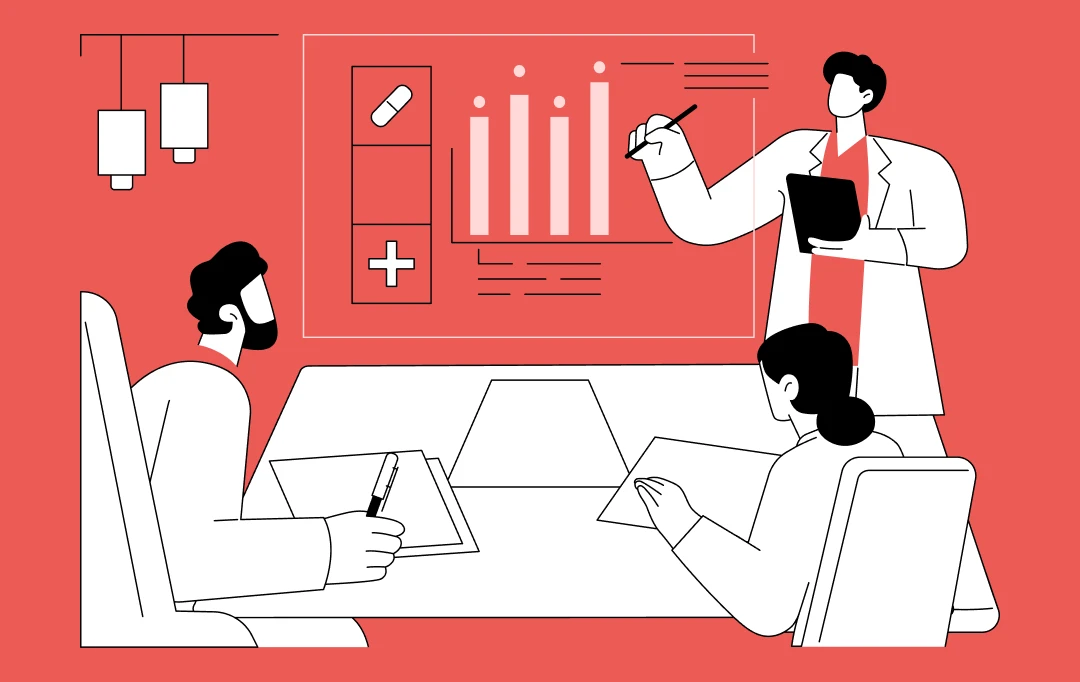
10 Ways Healthcare Providers Are Using Patient Analytics to Enhance Care Plans and Optimize Outcomes
Imagine a world where doctors don’t just react to health crises, but predict and prevent them before they happen. This is the reality with patient analytics for healthcare providers. The healthcare industry is no longer limited to treating symptoms—it’s now about understanding patterns, making smarter decisions, and delivering care that’s truly personalized. And it’s not…
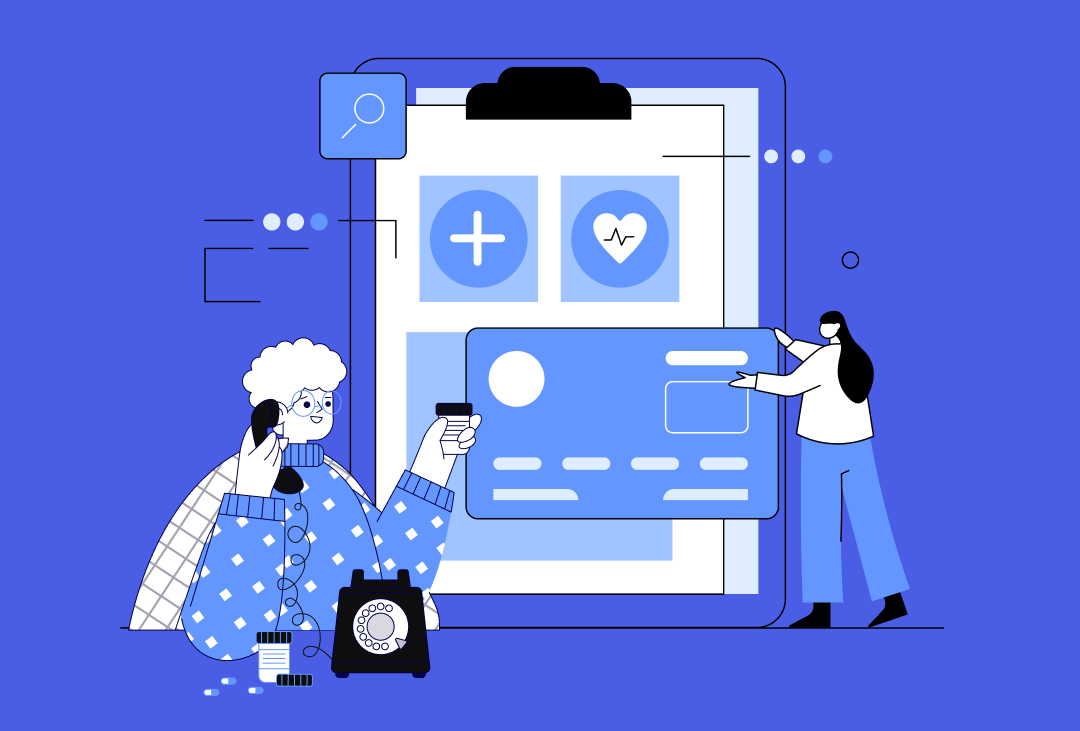
Exploring the Role of Personalization in Healthcare through Technology
Key takeaways: Personalization in healthcare transforms patient care from generic, population-based treatments to individualized approaches tailored to each patient's unique needs. Advanced technologies like AI, IoMT, and genomics are the core enablers for tailoring medical treatments. Personalization drives significant benefits, including improved patient outcomes, higher engagement, and reduced costs. The future of healthcare is hyper-individualized,…







